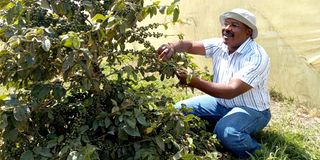Kieni farmers embrace coffee farming

Mr David Ndegwa tends to a coffee bush in his farm in Kieni. Othaya farmers are to earn Sh125 per kilo of the produce.
Traditionally, farmers in Kieni are known for horticulture and dairy farming but an agronomist in the vast semi-arid constituency has been growing coffee – a first within the county for the last three years.
The type of soil and availability of water has been the derailing factor to coffee farming in the constituency but Mr David Ndegwa says balancing the ratio between the cotton soil and manure ensures optimum production.
The coffee bushes on trial, he says, have a different percentage of manure between 0 to 75 percent which he is using to gauge the best practice to implement on a 20-acre farm.
“This is the Batian variety. The reasoning behind this trial is to demystify the myth that coffee can only grow in certain types of soil. My coffee plants have been a success,” he said.
With shrinking land coupled with poor pricing, the lull for coffee farming is diminishing as farmers embrace other crops while non-coffee growing zones such as Kieni, Laikipia, and Baringo are taking up the venture.
“The secret is not in having the best prices in the market but they matter, farmers should make a concerted effort in producing more, and that way there will be more money in their pockets. Domesticated animals need care from farmers,” he added.
The Batian variety is resistant to coffee berry disease which prevails in the cold seasons.
“The only setback to growing coffee in Kieni is that one needs water for irrigation. You will need a borehole and acquire loads of manure to grow the crop because the soils do not have sufficient organic matter. Manure is important because it allows aeration and retention of water,” he noted.
In the loam soils that have traditionally been conducive for coffee farming, a farmer needs a 2ft by 2ft hole while in the clay soil one will require 3ft by 3ft.
Former New Kenya Planters Cooperative Union (KPCU) chairman Henry Kinyua said coffee grows well in tropical weather and specifically requires ample sunshine and plenty of water that will trigger flowering and subsequent enhanced production.
He noted that Kieni constituency met all the requirements – moist soil, fertile and well drained but is constrained by water.
“To produce coffee in Kieni, one will require irrigation water to attain any coffee production. However, I would be hesitant to advise farmers to take up the venture as other commodities can bring similar income and can be produced in a more climate-smart manner,” he said.





